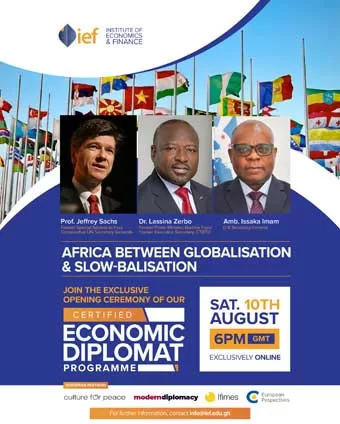By the kick off of the 2024 Certified Economic Diplomat (CED) program, the two influential figures — economist Jeffrey Sachs and Ambassador Isiaka Abdulqadir Imam, Secretary General of the Development 8 (dynamic and less known but highly impactful International Organization) — delivered impactful speeches that highlighted the critical role of economic diplomacy in Africa and global development. Their insights, while focusing on different aspects, presented a unified vision of how strategic cooperation, investment, and diplomacy can address global challenges and drive sustainable growth.
Jeffrey Sachs on Africa’s Development Potential
Jeffrey Sachs, probably the most influential economist of our times, drew parallels between Africa’s current position and China’s transformation from a low-income to a high-income country. He argued that Africa, with its vast population and resources, could replicate China’s success by adopting similar strategies, integrating its markets, and engaging more actively in global economic diplomacy.
Professor Sachs began by noting the demographic and economic similarities between Africa and China, with Africa’s population of around 1.5 billion closely matching that of China and India. Despite this, Africa is only starting its journey of economic growth, unlike China and India, which have been growing rapidly for decades. Sachs attributed China’s rise to strategic policy measures, substantial infrastructure investments, and significant improvements in human capital — elements he considered essential for Africa’s development.
The Need for Unification and Market Integration
A central theme in Sachs’ speech was the necessity for Africa to unify under a common economic and political framework. He proposed that by integrating its markets and policies, Africa could establish a large internal market, which would be the foundation for sustained economic growth. He envisioned a future where Africa operates under the “one sky”; with integrated transport, energy, and trade policies that enable the continent to function as a cohesive entity. Such unification, he argued, would expand Africa’s internal market and enhance its diplomatic influence globally.


Professor acknowledged the challenges posed by Africa’s fragmentation into 54 countries, each with unique obstacles and colonial legacies. Nevertheless, he remained optimistic that Africa could overcome these challenges with the right policies and integration efforts. He highlighted the recent inclusion of the African Union in the G20 (on his personal insistence with Prime Minister Modi during the India’s G-20 Chairmanship) as a significant step towards greater global recognition for Africa but stressed that this is just the beginning. Sachs emphasized that ambitious policies aimed at market integration and infrastructure development are crucial for positioning Africa as a major global economic player.
Infrastructure, Human Capital, and Financial Access
Sachs identified key drivers for Africa’s development: infrastructure investment, human capital development, and improved financial access. He stressed that infrastructure is vital for trade, connectivity, and resource access, calling for significant investments in electrification, transportation networks, and fiber-optic communications. These investments are essential for ensuring that all parts of Africa are connected and can participate in the global economy.
Human capital development was another priority for Sachs. He argued that the level of education largely determines a country’s economic success. Currently, the average schooling in Africa is about six years, which is insufficient for creating a competitive workforce. Sachs proposed increasing education to an average of at least 14 years, which he believed is crucial for driving innovation and economic growth.
Addressing financial access, professor noted that while countries like Italy and the United States can borrow at low-interest rates despite high debt-to-GDP ratios, African countries face higher borrowing costs. Instead of advocating for debt cancellation, Sachs suggested that Africa should be allowed to borrow at favorable rates similar to those enjoyed by developed countries. This would enable African nations to finance their development goals without accumulating unsustainable debt.
Global Partnerships and the Role of Economic Diplomacy
Both Sachs and Ambassador Isiaka underscored the importance of global partnerships in achieving their respective goals. Sachs emphasized that Africa must build strong partnerships with global powers such as China, the United States, and the European Union. He identified China not only as a role model but as a crucial partner in Africa’s growth, advocating for mutually beneficial cooperation.
Professor also discussed his vision for a multipolar world, where regions like Africa, Latin America, and Asia have significant influence. He argued for a collaborative global economy where no single region dominates. Sachs stressed that global cooperation is essential for addressing challenges like climate change, poverty, and inequality. Africa, with its vast potential, should be integral to this cooperative effort.
Ambassador Isiaka on the D-8 Intergovernmental Organization
Following prof. Sachs, Excellency ambassador Isiaka Abdulqadir Imam, Secretary-General of the D-8 Organization for Economic Cooperation, presented a complementary perspective on economic diplomacy. Speaking from the Istanbul D-8 HQ, Isiaka highlighted the growing importance of economic diplomacy amidst global disruptions caused by the COVID-19 pandemic and geopolitical crises. He praised the CED program for equipping diplomats with essential skills to navigate these complexities.
The D-8 Organization, which includes Bangladesh, Egypt, Indonesia, Iran, Malaysia, Nigeria, Pakistan, and Türkiye, aims to foster economic cooperation among its members, enhance their global economic positions, and create new trade opportunities. Excellency Isiaka emphasized the organization’s mission to improve participation in international decision-making and raise living standards. With a combined population of 1.3 billion and a GDP that has grown from $1.3 trillion to nearly $5 trillion, the D-8 has significant economic potential.
Excellency Isiaka also highlighted the CED training program, a collaboration between D-8 and IFIMES, for providing valuable insights into economic diplomacy best practices. He praised the program’s comprehensive approach and high-caliber research, which he believed would ensure a productive experience for participants. His speech reinforced the critical role of economic diplomacy in fostering international cooperation and achieving sustainable development.
